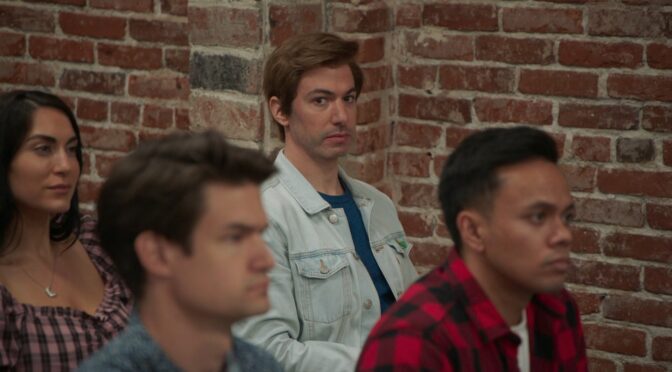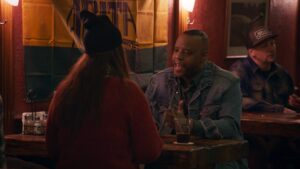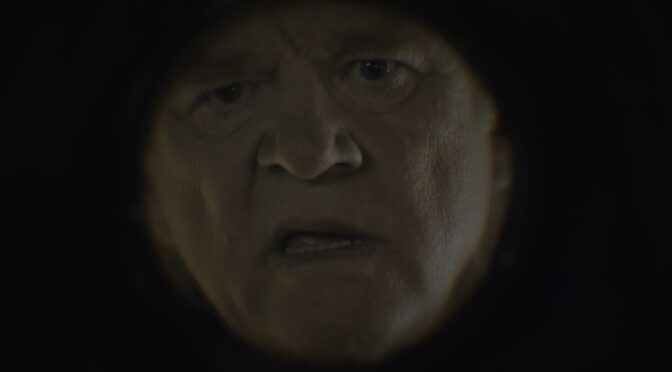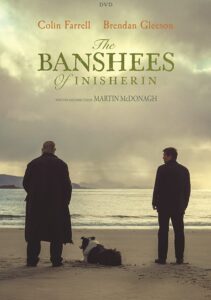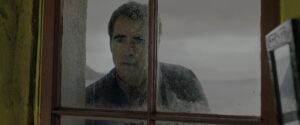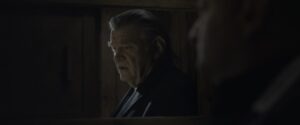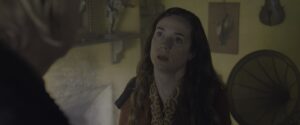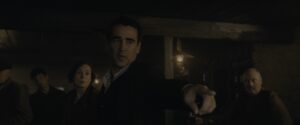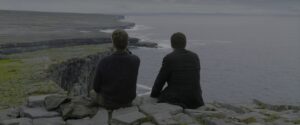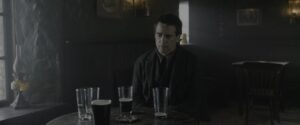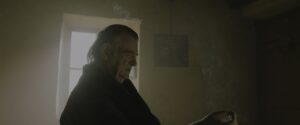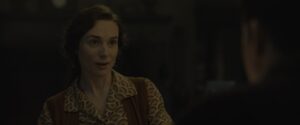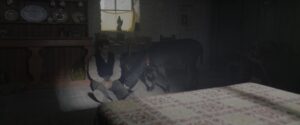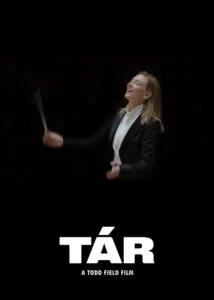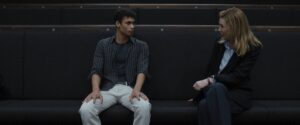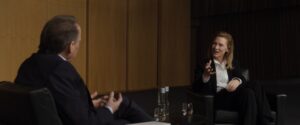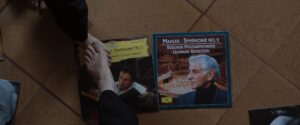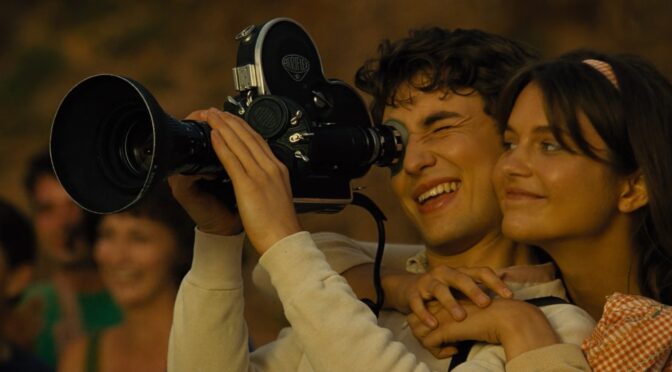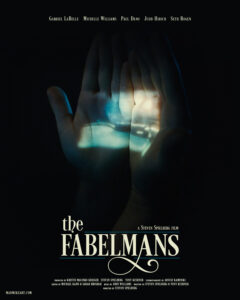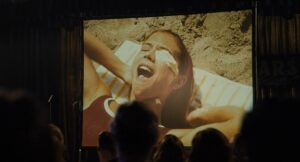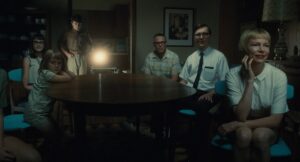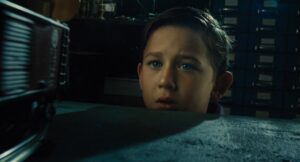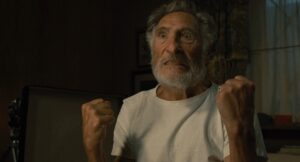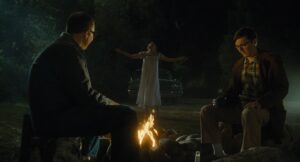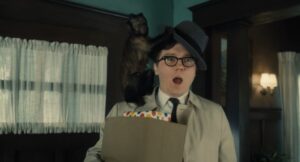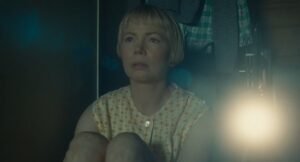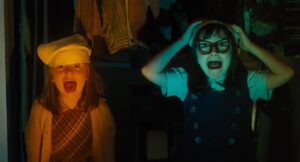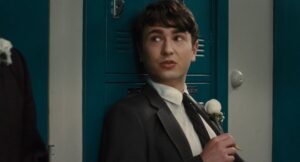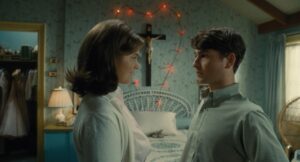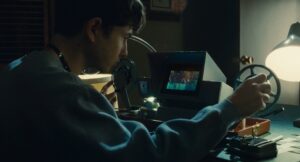
Anyone who says a true artist never repeats themselves isn’t paying attention to film history. So many of the great ones love to recycle (and recontextualize past elements of their work. Fellini and Scorsese love their religious imagery, especially when contrasted with the vulgar (or violent in Scorsese’s case), the sacred and profane. Michael Mann loves men at work. John Woo loves to punctuate an action scene with doves. Beyond themes and visual motifs, there are a great many filmmakers who love to bring back actors over and over throughout their careers. Akira Kurosawa and Toshiro Mifune. Ingmar Bergman and Liv Ullman. James Cameron and Bill Paxton. Both Wes Anderson and Christopher Guest have spent their careers regularly calling back whole softball teams’ worth of the same character actors like the theatre troupes of old. All of this is to say that deadpan comedian and new god of the televised medium, Nathan Fielder (his recent cringe satire with Emma Stone and Benny Safdie, The Curse, is now blowing minds and generating chatter), is in good company. Since his brilliant reality TV piss-take, Nathan For You, Fielder has loved to run it back, whether than meant a running theme (frequently his own inability to connect in the modern world) or a bit (Nathan For You‘s vignettes had a way of steadily stacking upon one another). More than anything, he loves bringing back the strange real-life characters he finds and using them in new scenarios far outside of how he originally found them. And he mines those repeat appearances not just for humor but surprising pathos. In Nathan For You‘s hour-long finale, he brought back a bizarre, distinctly untalented Bill Gates impersonator not for cheap mockery but for a strange and quietly heartbreaking journey into one eccentric old man’s romantic past. Nathan Fielder’s love for repetition takes him to some side-splittingly funny places, but what makes his repetitions so exciting and artful is his spontaneity. He’s not plugging these singular reality TV characters into the same old scheme. He’s letting the same personages walk into new situations and letting new realities play out.
Where can I buy good quality replica watches
In the world of horology, luxury watches hold a special place. However, not everyone can afford the hefty price tags that come with them. This is where replica watches come into play. They offer a more affordable alternative without compromising on style or quality. If you’re in the market for a good quality replica watch, you might wonder where to start your search. Let’s dive into the world of replica watches and explore the best places to buy them.
Understanding Replica Watches
What are replica watches?
Replica watches are exact copies of luxury timepieces, often created with meticulous attention to detail to resemble the original. They are crafted to emulate the design, features, and even the branding of renowned watchmakers.
Why are replica watches popular?
The popularity of replica watches stems from their affordability while still offering the prestige and style associated with luxury brands. They allow individuals to enjoy the look and feel of high-end timepieces without breaking the bank go to theweek.in/.
Factors to Consider When Buying Replica Watches
When purchasing a replica watch, several factors should be taken into account to ensure you get a quality product.
Quality
Opt for replicas made from high-quality materials to ensure durability and longevity. Attention to detail in craftsmanship is also essential for a convincing replica.
Brand Reputation
Choose reputable sellers known for producing accurate and well-crafted replica watches. Researching the seller’s reputation can help you avoid scams and low-quality products.
Price
While replica watches are more affordable than their authentic counterparts, excessively low prices may indicate inferior quality. Be willing to invest a reasonable amount for a well-made replica.
Customer Reviews
Read reviews and testimonials from previous buyers to gauge the quality and reliability of the replica watch and the seller’s services.
Where to Buy Good Quality Replica Watches
Online Marketplaces
Platforms like Amazon, eBay, and AliExpress offer a wide selection of replica watches from various sellers. Be cautious and research the seller thoroughly before making a purchase.
Specialized Replica Watch Websites
Dedicated websites specializing in replica watches often provide a curated selection of high-quality replicas. These sites may offer more assurance regarding authenticity and quality control.
Physical Stores
Some brick-and-mortar stores specialize in selling replica watches. Visiting these stores allows you to examine the watches in person and assess their quality firsthand.
Tips for Purchasing Replica Watches Online
Research the Seller
Before making a purchase, research the seller’s reputation, customer feedback, and return policies to ensure a smooth transaction.
Check for Authenticity
Look for subtle differences between the replica and authentic versions of the watch, such as logo placement, serial numbers, and overall build quality.
Read Customer Feedback
Customer reviews can provide valuable insights into the quality and reliability of both the replica watch and the seller’s services.
Top Brands for Replica Watches
When it comes to replica watches, certain brands stand out for their quality and attention to detail.
Rolex
Rolex replica watches are highly sought after for their precision engineering and timeless design. They are often indistinguishable from the authentic models.
Omega
Omega replicas are known for their accuracy and durability, making them a popular choice among watch enthusiasts.
Tag Heuer
Tag Heuer replica watches combine sporty elegance with Swiss craftsmanship, offering affordable alternatives to the original models.
He’s not just lampooning reality television; he’s curious about how reality (televised or not) is constructed and who does the constructing. It’s not just cool and funny and wildly entertaining. It’s literally the same way that a lot of great directors create the most organically natural films (I wonder how the great Mike Leigh would feel about getting mentioned next to Comedy Central’s own Nathan Fielder)). His miraculously strange and singular six -episode reality miniseries, The Rehearsal, is a natural yet completely unforeseeable culmination of Fielder’s fixations. It’s a masterwork that not only marshals the power of obsessive repetition but asks questions about why we repeat ourselves.

Describing the plot is consistently my least favorite part of film criticism, so luckily for me The Rehearsal doesn’t have the kind of structure one describes in detail. It has an opening premise, the kid of idea that could be repeated episode by episode like so many of the reality television programs that Nathan For You sent up and spoofed. The germ of an idea here is that Fielder will find people dreading some fateful, looming conversation with a friend or loved one and he will help them rehearse for it. And, because this is Nathan Fielder, rehearsing doesn’t just mean running through what the person has to say but running through a dense spiderweb of reactions the other side of the conversation might have; any conceivable thing they might say or do. Nathan Fielder doesn’t so much help them create a script as bring an entire flowchart to life. It means hiring extras and building sets all in service of rehearsing an elaborate tree of possible realities. The idea is that this will help the nervous, conflict-phobic beneficiary feel more comfortable not only with having a talk but with every version of reality they can imagine. And when I say “reality”, I mean not just the conversation but the physical details of where the talk will take place. It means constructing elaborate facsimiles of houses and restaurants. It means conducting detailed research on the person his latest subject will be talking to. What Fielder, a man long curious about artificial realities, is attempting to simulate is nothing short of reality itself. In the first episode, a socially awkward pub trivia nerd has to confess to his teammate that he has been lying for years about having his Master’s Degree and is fearful the admission of his deceit will terminate their friendship. Nathan builds the pub. A working bar full of actors playing patrons. A bar with its own fake staff and fake working kitchen full of people pretending to cook food. It’s funny, absurd and fascinating. And then, in episode 2, the show’s premise completely changes, when Fielder helps a single Christian woman rehearse having a child by letting her live for weeks with a fake baby (actors playing the baby at different ages, that is) in a fake house run by Fielder from a control room with children ranging from infants to 15-year olds playing her fake child as it rapidly grow up. By episode 3, The Rehearsal‘s concept has expanded and mutated to the point of being unrecognizable and the snowballing social experiment has completely overtaken Nathan Fielder (he always is the true butt of his jokes), turning him from his own show’s director and architect into a full-time participant. The mad scientist sucked into his own demented machine.
I can’t say I predicted virtuoso of awkwardness Nathan Fielder capturing the trippy, meta-textual Charlie Kaufmann spirit better than anybody not named Charlie Kaufmann. Maybe I should have. The signs were always faintly visible. In Nathan For You, the simple objective of helping a small business market themselves mutated into convoluted Rube Goldberg plots; outrageous examples of the tail wagging the dog. That show always had a touch of the Ouroboros to it. Fielder would seize upon a dumb idea for a local business to attract customers, but executing his idea would always require him to hatch infinitely dumber and more outlandish ideas (like when he paid a stranger to change his name to Michael Richards, just so a cafe could act like Kramer once dined there). The Rehearsal is Fielder doing what he’s always done on a vast, HBO-funded canvas. If Nathan For You saw him mocking reality TV artifice by daftly twisting truth to meet his ends, The Rehearsal is him inventing fake real worlds out of whole cloth. It’s very fitting that he’s not only subverting the reality TV format again, but this time making a bonafide single-concept (at least for a moment) reality TV program. They say you have to love what you parody, and The Rehearsal is Fielder’s renewed vow of devotion to the reality format. Loving it honestly means loving it in his own special Nathan Fielder way: larking about, gently teasing it and reflecting televised reality (that great oxymoron) back at itself through a dozen different funhouse mirrors. The Charlie Kaufmann of it all is how The Rehearsal churns actual reality and TV reality, truth and fantasy, together until his show becomes a true paradox of fake-real. With one magician’s hand, he unnerves and confuses us and with the other he pulls threads of genuine insigne and poignant truth from his sleeve. The distorted mirror he creates for that Christian woman is so dizzyingly strange that she eventually bails on the project and leaves Nathan as the one remaining constant; the man pulling the strings performing his bizarre magic act for nobody but himself (and us, of course). He conjures an entire dreamworld to help these entrants, but like children in Willy Wonka’s factory (one man compares Nathan to the magically disquieting chocolatier), they fall away. We realize the story is less about what the subjects hope to achieve by participating in Fielder’s show, and more about why Fielder felt compelled to create it in the first place.
I hope I am not being overly vague in describing what happens in this hilariously bewildering mindfuck of a miniseries. Partly, it’s that it feels too hazy and surreal to just deconstruct, as if that would undo its wondrous spell. Go describe a magic trick! It’s also tough to describe a show that feels designed to be slippery and erratically shifting. A basic account of what happens and who shows up does nothing to capture its essence. Suffice to say though, the people who populate these four hours of heady delirium might be the major secret to its brilliance. It’s another talent that Fielder has brought over from his work on Nathan For You and sharpened to razor perfection. The man has the knack for finding the most unforgettably idiosyncratic and authentically funny people on Earth. Have you ever met a truly unique person and told friends, “You wouldn’t believe this guy. He’s a total character.”? I don’t know if Nathan Fielder just wanders through life constantly running into the most elite oddballs, like one of those pigs who sniffs out gourmet truffles. But he certainly knows them when he sees them, and not a one of them feels stock or stereotypical. If you hear me mention a single Christian aspiring mother and have an image in your head, let me inform you that you probably only have about 10% of it. Fielder has a smidgeon of sharp meanness in his comedy, but sweetness and real curiosity always win out with him. He only judges a tiny bit, but he also graciously cedes the spotlight to them and lets their beautiful, ineffable weirdness take center stage. He is obviously the most (only) famous person in The Rehearsal, but he knows the subjects he finds are the stars. Much of the reality TV I’ve seen does come off as grotesque (sorry, Nathan), a parade of shrill caricatures for the viewer to look down on. But Fielder’s people feel full and complex (even the shrill ones). You won’t soon forget any of them, and I’ll wager you’ll remember them in more three-dimensional, human terms than the people you watch on Discovery and Bravo. For all the snarky irony in Fielder’s lampooning of reality TV, for all the fun he has showing human frailty and insecurity, I don’t think he ever sets out to simply mock these people. I think he’d sooner we look at them and recognize something similarly weird in ourselves that we can chuckle at and maybe embrace.
But Fielder is not content to simply find fascinating screen presences. He has decided he would like to make some from scratch, or more specifically find people who can make them. As ever, the genesis for Nathan Fielder’s idea starts out simple. It’s born out of basic necessity. He’ll need to find extras to populate these artificial worlds he creates. But, because perfecting each social experim
\ent (each rehearsal) means making his fake worlds as authentic as possible, he finds himself demanding increasingly more authenticity from his extras. What he needs aren’t just bodies to fill these spaces. He needs actors. Every concept in The Rehearsal is like the monst
er from John Carpenter’s The Thing. It may start out as a dog: Nathan needs actors to fill out his meticulously rendered rehearsals. But what it ends up as is a tentacle monster: Nathan Fielder has to start an acting conservatory in Los Angeles to steadily pump out more actors for his endless scenarios. And the patented Fielder Method taught at Nathan’s conservatory is one that Daniel Day-Lewis might say is a little much. I misspoke when I said that The Rehearsal turns into Fielder alone in his dream factory. What it more accurately turns into is Fielder in his dream factory surrounded by people playing the roles of other people that Fielder has trained and hired them to play for the benefit of a subject who is no longer there. Fielder the artist becomes Fielder the subject interacting on multiple levels with his actors. Actors who, once again, he has trained to help act out realistic, detailed scenarios of what could be real life. But with his participants gone, the actors still stay on to do their jobs, but with the grand objective increasingly unclear. Unclear to no one so much as Fielder himself (his talent for tuning the job on himself really is the key to his genius). Werner Herzog’s Aguirre the Wrath of God ends with an obsessive maniac lost in the wilderness and surrounded by monkeys. The Rehearsal ends the same way, if you replace “monkeys” with “actors”. The fact that the original concept for The Rehearsal falls apart and gets sucked into a Kaufmannesque meta-hole is very funny. The fact that the disciples of the Fielder Method turn out to be legitimately great at acting is the funniest joke of 2022. The Rehearsal may come up short in its search for reality and authenticity, but it does take us into a ruefully witty World of Pure Imagination.
Various insightful pieces have been written about how The Rehearsal speaks to people on the Autism Spectrum. And, as someone who lives somewhere along that street, I’ll say I wholeheartedly agree that it speaks to us. I think it also speaks to the general struggle to understand in a time marked by confusion; to understand what is real and to separate the authentic from the fake. And, if I didn’t already muse on it in a different top 10 review (Marcel the Shell With Shoes On), I could probably devote a paragraph to how it speaks to COVID-era loneliness and social anxiety; how we’ve all had to gradually rebuild our social muscles in the last few years. The Rehearsal is a work of artistic genius because it speaks to a lot in the human condition. But every autistic person has probably thought about how they might become a little more normal through practice. What Fielder sets out to do here is reduce enough of the chaos and unpredictability in life to have some control over the outcome. But as he does so, he also worries if all that constructing of reality isn’t making reality less real. If you have to rehearse reality to manage it, how authentic does that make you as a person? If you have to analyze human behavior and emotions under a magnifying glass to better understand them, does that draw you further from authentically feeling and having those emotions? Does looking hard at reality though a magnifying glass actually warp it and make it harder to really grasp? People on the Autism Spectrum understand the paradoxical tug-of-war between practicing behavior and effortlessly grasping behavior. The other community that understands that struggle is actors. An actor must study hard and internalize their scene up to a point. And then, they must simply embody that knowledge without apparent effort. They must study enough to create the appearance of being unstudied. It’s a heady, funny idea that Fielder mines to deadpan delirious effect. It’s also a very relatable rabbit hole to go down. From time to time, we all feel not quite ourselves.
